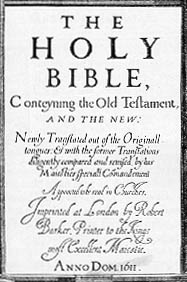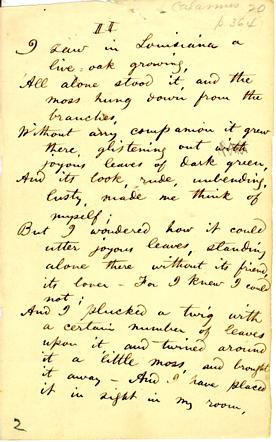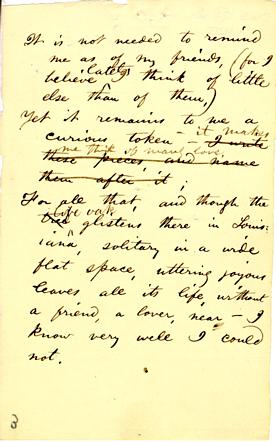
Bible, King James. Ecclesiastes (Qoheleth), from The holy Bible, King James version
Electronic Text Center, University of Virginia Library
|
Anxiety of Influence |
Be Prepared to Write about the Influences on Whitman's Poetry:
 |
Bible, King James. Ecclesiastes (Qoheleth), from The holy Bible, King James version Electronic Text Center, University of Virginia Library |
1: The words of the Preacher, the son of David, king in Jerusalem.
2: Vanity of vanities, saith the Preacher, vanity of vanities; all is vanity.
3: What profit hath a man of all his labour which he taketh under the sun?
4: One generation passeth away, and another generation cometh: but the earth abideth for ever.
5: The sun also ariseth, and the sun goeth down, and hasteth to his place where he arose.
6: The wind goeth toward the south, and turneth about unto the north; it whirleth about continually, and the wind returneth again according to his circuits.
7: All the rivers run into the sea; yet the sea is not full; unto the place from whence the rivers come, thither they return again.
8: All things are full of labour; man cannot utter it: the eye is not satisfied with seeing, nor the ear filled with hearing.
9: The thing that hath been, it is that which shall be; and that which is done is that which shall be done: and there is no new thing under the sun.
10: Is there any thing whereof it may be said, See, this is new? it hath been already of old time, which was before us.
11: There is no remembrance of former things; neither shall there be any remembrance of things that are to come with those that shall come after.
Whitman's Original Manuscript
 |
 |
The Brooklyn Eagle
The Brooklyn Eagle was founded in 1841 by a group of Democrats, with Henry C. Murphy, later mayor of Brooklyn, as editor. Walt Whitman edited it from 1846 to 1848, and so vigorously did he oppose the extension of slave states that he was forced out of the editorship; shortly afterward Whitman joined the staff of the radical Brooklyn Freeman. In recent years the Eagle acquired the Brooklyn Times-Union which had been the Brooklyn Daily Times until its acquisition of the Brooklyn Standard Union.
An interesting article written by Whitman in 1846: "A Certain Game of Ball 1846"
Writer Walt Whitman wrote in the July 1846 Issue of the 'Brooklyn Eagle'- In our sun-down perambulations of late, through the outer parts of Brooklyn, we have observed several parties of youngsters playing 'base', a certain game of ball.'
Later in 1846, Walt Whitman wrote: 'I see great things in base ball. Its' our game... The American game. It will take our people out of doors, fill them with oxygen, give them a large physical stoicism. Tends to relieve us from being a nervous, dyspeptic set. Repair these losses, and be a blessing to us.'
(Image here)
Opera was one of the many attractions that encouraged Whitman's frequent returns to New York. In 1846 Whitman began attending performances (often with his brother Jeff), a practice that was disrupted only by the onset of the Civil War (and even dour ping the war, he managed to attend operas whenever he got back to New York). Whitman loved the thought of the human body as its own musical instrument, and his fascination with voice would later manifest itself in his desire to be an orator and in his frequent inclusion of oratorical elements in his poetry. For Whitman, listening to opera had the intensity of a "love-grip." In particular, the great coloratura soprano, Marietta Alboni, sent him into raptures: throughout his life she would remain his standard d for great operatic performance, and his poem "To a Certain Cantatrice" addresses her as the equal of any hero. Whitman once said, after attending an opera, that the experience was powerful enough to initiate a new era in a person's development. When he later composed a poem describing his dawning sense of vocation ("Out of the Cradle Endlessly Rocking"), opera provided both structure and contextual clues to meaning.
Links:
Good Whitman page: http://www.underthesun.cc/Classics/Whitman/
The Whitman Hypertext Village: http://jefferson.village.Virginia.EDU/whitman/